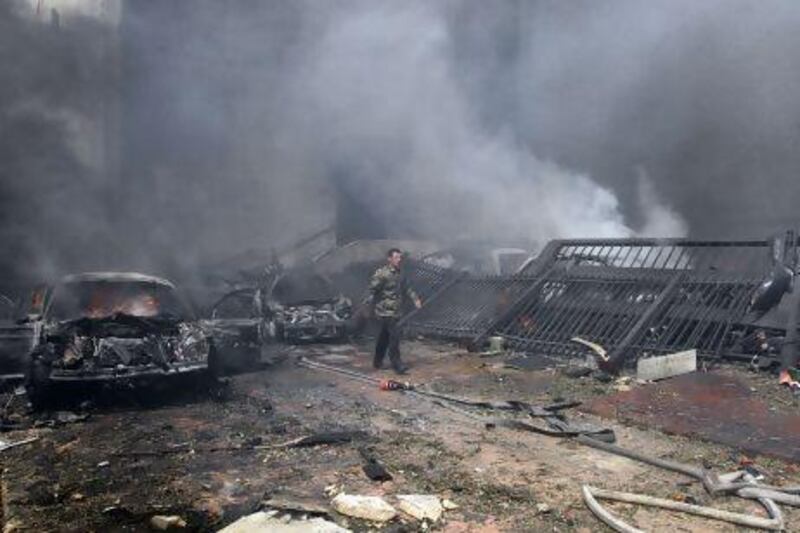BEIRUT // A suicide car bomb killed at least 15 people and wounded 53 in the main business district of Damascus yesterday in what the Syrian prime minister said was a response to army gains against rebels.
The explosion came as The UN secretary general Ban Ki-moon said inspectors were ready to deploy to Syria within 24 hours to investigate reports of chemical weapon attacks, but have not yet received permission from President Bashar Assad's government.
The bomb near a school in the Sabaa Bahrat district, which also houses the central bank and finance ministry, set cars ablaze and damaged buildings, state television footage showed.
A Damascus resident who described the blast as the biggest she had heard in the capital during the two-year revolt against Mr Al Assad said large plumes of black smoke were rising from the Sabaa Bahrat district.
Car bombs and attacks on civilians are commonplace in the Syrian conflict, which the United Nations estimates has killed more than 70,000 people.
Each side has accused the other of using chemical weapons, among other breaches of international law, although it remains unproven whether such weapons have actually been fired.
After the car bomb blast, Syrian television showed footage of seven bodies in the street, including at least two charred corpses in the wreckage of an overturned bus. Other vehicles were still on fire, lined up in what appeared to be a car park.
A woman with a blood-covered face was carried away on a stretcher. Panic-stricken women in long black dresses and headscarves ran towards the scene. Some children in school uniform were shown in bandages.
The state television presenter described the attack as unprecedented and said: "We only have one choice, either win or die."
Angry and terrified residents interviewed by the channel called for decisive army action. "Look at Damascus. Is this Damascus? Look what is happening to it," said a man.
There was no immediate claim of responsibility for the attack, but each side blamed the other.
Syrian insurgents based in the outskirts of Damascus have pushed into areas near the government-held heart of the city, stepping up mortar and car bomb attacks in recent weeks.
Wael Al Halqi, the prime minister, said yesterday's bombing was a response "to the great achievements of the Syrian army, especially in the Damascus countryside".
He said the Syrian army was "determined to go forward and will crush" the rebels.
In the divided northern city of Aleppo, where a military stalemate has lasted for months, government troops took the outlying village of Al Aziza, which sits next to the main motorway and near the airport, opposition activists said.
They said the capture of the strategically important village could allow the army to push on into districts captured by insurgents in the south of the Syria's biggest city.
Mr Ban, who met the head of the global chemical weapons monitoring body in The Hague yesterday, said the UN investigators only needed a green light from Damascus.
"We are ready," he said. The full team will consist of 15 experts, including inspectors, medical experts and chemists.
"All we are waiting for is the go-ahead from the Syrian government to determine whether any chemicals weapons were used, in any location," Mr Ban said. He urged the Syrian government to be more flexible so the mission could deploy as fast as possible.
Syria has asked the United Nations to investigate an alleged chemical attack on Khan Al-Assal village, near Aleppo, on March 19 which it blames on insurgents. The opposition, which says the government was behind the attack, wants the UN team's remit to include other alleged chemical attacks in Damascus and Homs.





